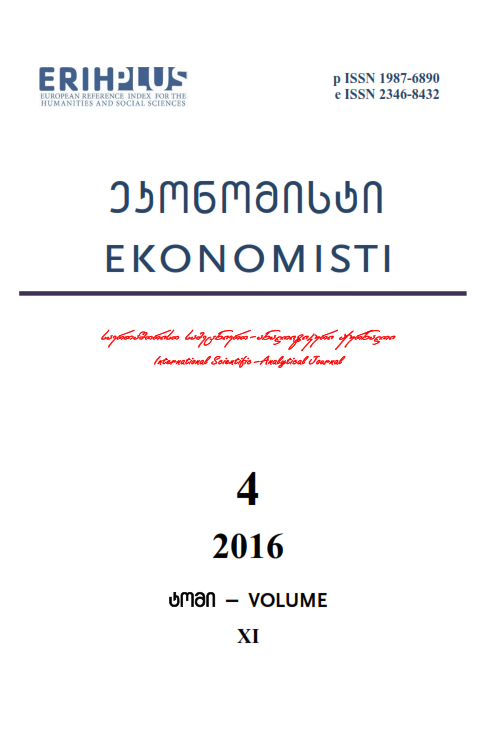
The international scientific and analytical, reviewed, printing and electronic journal of Paata Gugushvili Institute of Economics of Ivane Javakhishvili Tbilisi State University

EFFECTIVE EMPLOYMENT-THE KEY FACTOR IN HUMAN WELFARE AND ECONOMIC GROWTH IN GEORGIA
Expanded Summary
In the era of modern globalization, when the country is actively involved in the process of euro – integration, the principal objective of inclusive economic growth and development represents the improvement of the quality of work life and the rise of living standards of the population. The latter is impossible to be achieved without the enhancement of human resources and the rational, effective utilization of the existing labor potential. That is why, the struggle for decent work, life conditions and social safety holds the leading place and becomes the essential goal of the macro-economic policy of the state. Employment is the arduous socio-economic, demographic and psychological phenomenon which can be regulated through applying the systemic approach and taking the complex measures. Based on the aforesaid, the top priority is given to the employment policy. And the realization of the principle –“ The decent work is the foundation for human welfare and development of a country” –, universally acknowledged by the International Labor Organization, first of all, requires the formation of social – labor relations adequate to the civilized, modern labor market, the establishment of the system of social justice and partnership as well as the development of human capital and the improvement of its quality. The latter must become the prime target for the modernization and innovative development of economy of the country. The main indicator determining the decent work is the decent salary and the remuneration of labor. And the basis for achieving both of them is the effective employment and the developed, balanced and steady labor market. According to the above mentioned, the “effective employment” implies the kind of employment of population, which will provide each citizen with the decent income, foster their personal development and raise the level of their educational, cultural and professional qualification and which is expedient to be discussed from two aspects: economic- implying the development of labor potential and its rational utilization and the social aspect, which provides serving the employers’ interests to the limit.
Unfortunately, there exist a number of problems hindering the provision of effective employment in Georgia. In particular, the low level of employing the labor potential and productivity is conditioned by a set of problems among which the following should be outlined:
ü The lack of developed infrastructure of labor market and the absence of unified information system;
ü The limited labor demand and the poor prospects of employment accounted for by the undue pace of economic development;
ü The low level and quality of improving the vocational education system and the lack of focus on the demands of labor market;
ü The low level of professional mobility of labor force;
ü The absence of mechanism for social protection of the unemployed;
ü The low labor productivity level and culture in enterprises and organizations;
ü The low level of organization and encouragement of labor remuneration and the absence of modern forms and system of pay;
ü Non-compliance with the principles of labor remuneration and the failure to fulfil its main functions;
ü The absence of practice of scientifically well-grounded management regulating the sphere of employment and social-labor relations as well as the relevant legislative base.
On the basis of the mentioned circumstances, the solution to the problems of unemployment and the provision of the effective employment in Georgia demand the use of principally new mechanisms of social partnership, which, first of all, implies the utilization of civilized forms of partnerships among the subjects of labor market and the introduction of the practice of regulations on collective agreements. The problems of unemployment should not be tackled spontaneously. It requires the scientifically well-grounded approach in economic as well as social terms. The effective employment does not mean only the mechanical increase in quantity of the employed. Here the point is to consider its pivotal motive and social aspect. Particularly, it should provide: the realization of labor rights; the high living standards and conditions for decent existence; the stimulus for highly-effective labor based on the due “decent” remuneration; the growth of professional potential and the encouragement of personal advancement; Exactly this type of effective employment will become the essential tool for pursuing the active policy of labor market and the principal factor for overcoming the poverty.
Depending on the results from the research and analysis presented in the work, in order to overcome the chronic unemployment and ensure the effective employment of the population in the country, it is expedient to settle the following major issues within the active policy of employment:
- The perfection and improvement of legal framework in the area of labor and employment. The compliance with the main principles of the Conventions (Convention N88; N122; N181) related to this sphere and ratified by the Government of Georgia as well as the due fulfillment of their demands;
- The realization of the constitutional right to labor, the adherence to the working conditions and labor rights stipulated by the law;
- The radical transformation of the education system, especially vocational education, of Georgia in correspondence with the modern, knowledge-based principles, which will ensure the preparation of labor forces focused on the demands of labor market and eradicate the existing misbalance;
- The development of the target programs contributing to career orientation of the youth taking into account the actual situation existing on the labor market;
- With the aim of successful realization of the active policy of employment it is expedient to introduce the effective system of its implementation and monitoring of the results.
